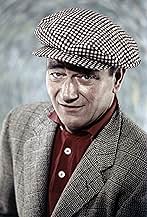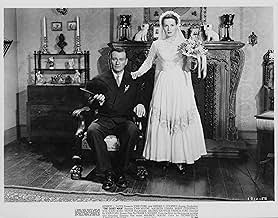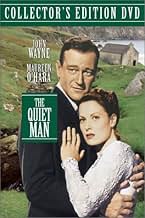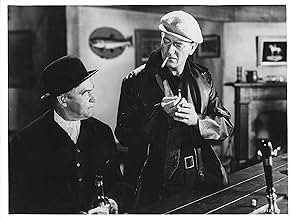IMDb-BEWERTUNG
7,7/10
43.412
IHRE BEWERTUNG
Ein amerikanischer Boxer im Ruhestand kehrt in sein Geburtsdorf in Irland zurück, wo er sich in eine temperamentvolle Rothaarige verliebt, deren Bruder ihre Verbindung verachtet.Ein amerikanischer Boxer im Ruhestand kehrt in sein Geburtsdorf in Irland zurück, wo er sich in eine temperamentvolle Rothaarige verliebt, deren Bruder ihre Verbindung verachtet.Ein amerikanischer Boxer im Ruhestand kehrt in sein Geburtsdorf in Irland zurück, wo er sich in eine temperamentvolle Rothaarige verliebt, deren Bruder ihre Verbindung verachtet.
- 2 Oscars gewonnen
- 11 Gewinne & 8 Nominierungen insgesamt
Charles B. Fitzsimons
- Hugh Forbes
- (as CHARLES fitzSIMONS)
James O'Hara
- Father Paul
- (as James Lilburn)
Sean McClory
- Owen Glynn
- (as Sean McGlory)
Jack MacGowran
- Ignatius Feeney
- (as Jack McGowran)
Handlung
WUSSTEST DU SCHON:
- WissenswertesJohn Wayne was disappointed by the unconvincing studio sets that were used for exterior scenes.
- PatzerBefore Sean enters Mary Kate's home to ask her brother's permission to court her, the flowers he's carrying are very sad looking. After he enters the house, they change into a nice, full, colorful bouquet.
- Zitate
Mary Kate Danaher: Could you use a little water in your whiskey?
Michaleen Flynn: When I drink whiskey, I drink whiskey; and when I drink water, I drink water.
- VerbindungenFeatured in Directed by John Ford (1971)
- SoundtracksThe Wild Colonial Boy
(uncredited)
Traditional
Adapted by Sean O'Casey and Dennis O'Casey
Performed by John Wayne, Ken Curtis, and Francis Ford and others in the Pub
Reprised a cappella by Wayne and Victor McLaglen
Ausgewählte Rezension
Maureen O'Hara in Technicolor is surely any Irishman's dream, and "The Quiet Man" would be timeless for that alone. But O'Hara's performance is all the more indelible for the great good humor she bestows on her character, Mary Kate Danaher. Let's face it; with any other actress, this could have been a disaster.
Sean Thornton (John Wayne) comes back to County Mayo, his birthplace, to find a peace he lost tragically back home in America. He immediately discovers some old friends, and a new one, too, Mary Kate, who while herding sheep stares back at him in what James Joyce might have called "a significant manner."
Director John Ford elects to shoot O'Hara from an odd angle, and with an unusual overhead shadow crossing O'Hara's face, that in anyone else's hands would have totally blown the shot but here creates something, well, "Homerific." It's one of many amazing shots in a film that seems more painted than photographed, and is perhaps the most strikingly lovely film ever made.
The shot of O'Hara looking back at Wayne also clues you onto something else, that this is going to be her story as much as it is Thornton's. In fact, it's really more about her than it is about him, a film about romance and a woman's liberation at the hands of her lover. We call them "chick flicks" today. But since John Wayne is the nominal star and no one ever confused Ford with Douglas Sirk, "The Quiet Man" isn't popularly regarded this way.
It's fun to read all the comments about poor Mary Kate and how this film glamorizes the mistreatment of women. They have one thing right, it's a film about spousal domination, but it's the wife ruling the husband. Think about it: She makes her lover do just about everything he does in the film, even risk bodily injury at the hands of her brutish brother (she doesn't know about his past and thinks she married "a coward.") People complain that he drags her across a dung-covered field, while a helpful woman hands him a stick "to beat the lovely lady with." But of course it's Mary Kate who's in total control of the situation. She wants Thornton to fight for her, in every sense of the word, and won't make it easy. She wants him to adapt to her culture, rather than adapt to his. (She's not one to be "honked at," as she puts it.) It's not surprising she trips and falls at one point while Thornton pulls her across a field; probably one of those puppet strings of hers got in the way.
But there are worse things in life than being enslaved by the likes of Maureen O'Hara, like not being enslaved by the likes of Maureen O'Hara. She's not only beautiful and pure-hearted, but such a hilarious joy to be around. O'Hara plays up the comedy of her scenes very well; she could have opted for a more regal distance from the slapstick but plays it as rowdy as the rest instead. The scene when she spits in her hand before shaking with matchmaker Michaleen Flynn (Barry Fitzgerald, who gives the next-best performance after O'Hara) tells you who she is better than any of her many sexy moments on screen. It also gets back to the point of why she's so essential in this film. She is Ireland, the spirit of Erin, and you want her to win, not because she's so pretty but because you know she's good and right for Sean, too.
About the only things wrong with the film are the action sequences, the horse race and the fistfight between Sean and Mary Kate's brother. It's not because the scenes aren't terrific, but because they are so abbreviated, especially the fistfight, which feels likes its building to something even funnier and more rousing than what's come before when it just sort of stops. Ford apparently had to do some cutting to get his film in at the required length, and with his focus as much on Mary Kate as possible, probably preferred to trim the scenes that had the least to do with her. But since the focus on O'Hara is what makes the film anyway, this is a small matter. Wayne fans wanting more action will just have to content themselves with almost every other film the Duke ever made.
Seeing this film for the first time reminded me a lot of "Local Hero," the 1982 comedy. Not only is "The Quiet Man" also a fish-out-of-water story about an American in the British Isles (Scotland in "Local Hero"), both films maintain a very delicate balancing act between whimsy and pathos, with "The Quiet Man," siding on the former direction and "Local Hero" the latter. Definitely worth checking out the one if you saw and liked the other. But "Quiet Man" was there first.
Sean Thornton (John Wayne) comes back to County Mayo, his birthplace, to find a peace he lost tragically back home in America. He immediately discovers some old friends, and a new one, too, Mary Kate, who while herding sheep stares back at him in what James Joyce might have called "a significant manner."
Director John Ford elects to shoot O'Hara from an odd angle, and with an unusual overhead shadow crossing O'Hara's face, that in anyone else's hands would have totally blown the shot but here creates something, well, "Homerific." It's one of many amazing shots in a film that seems more painted than photographed, and is perhaps the most strikingly lovely film ever made.
The shot of O'Hara looking back at Wayne also clues you onto something else, that this is going to be her story as much as it is Thornton's. In fact, it's really more about her than it is about him, a film about romance and a woman's liberation at the hands of her lover. We call them "chick flicks" today. But since John Wayne is the nominal star and no one ever confused Ford with Douglas Sirk, "The Quiet Man" isn't popularly regarded this way.
It's fun to read all the comments about poor Mary Kate and how this film glamorizes the mistreatment of women. They have one thing right, it's a film about spousal domination, but it's the wife ruling the husband. Think about it: She makes her lover do just about everything he does in the film, even risk bodily injury at the hands of her brutish brother (she doesn't know about his past and thinks she married "a coward.") People complain that he drags her across a dung-covered field, while a helpful woman hands him a stick "to beat the lovely lady with." But of course it's Mary Kate who's in total control of the situation. She wants Thornton to fight for her, in every sense of the word, and won't make it easy. She wants him to adapt to her culture, rather than adapt to his. (She's not one to be "honked at," as she puts it.) It's not surprising she trips and falls at one point while Thornton pulls her across a field; probably one of those puppet strings of hers got in the way.
But there are worse things in life than being enslaved by the likes of Maureen O'Hara, like not being enslaved by the likes of Maureen O'Hara. She's not only beautiful and pure-hearted, but such a hilarious joy to be around. O'Hara plays up the comedy of her scenes very well; she could have opted for a more regal distance from the slapstick but plays it as rowdy as the rest instead. The scene when she spits in her hand before shaking with matchmaker Michaleen Flynn (Barry Fitzgerald, who gives the next-best performance after O'Hara) tells you who she is better than any of her many sexy moments on screen. It also gets back to the point of why she's so essential in this film. She is Ireland, the spirit of Erin, and you want her to win, not because she's so pretty but because you know she's good and right for Sean, too.
About the only things wrong with the film are the action sequences, the horse race and the fistfight between Sean and Mary Kate's brother. It's not because the scenes aren't terrific, but because they are so abbreviated, especially the fistfight, which feels likes its building to something even funnier and more rousing than what's come before when it just sort of stops. Ford apparently had to do some cutting to get his film in at the required length, and with his focus as much on Mary Kate as possible, probably preferred to trim the scenes that had the least to do with her. But since the focus on O'Hara is what makes the film anyway, this is a small matter. Wayne fans wanting more action will just have to content themselves with almost every other film the Duke ever made.
Seeing this film for the first time reminded me a lot of "Local Hero," the 1982 comedy. Not only is "The Quiet Man" also a fish-out-of-water story about an American in the British Isles (Scotland in "Local Hero"), both films maintain a very delicate balancing act between whimsy and pathos, with "The Quiet Man," siding on the former direction and "Local Hero" the latter. Definitely worth checking out the one if you saw and liked the other. But "Quiet Man" was there first.
Top-Auswahl
Melde dich zum Bewerten an und greife auf die Watchlist für personalisierte Empfehlungen zu.
Details
Box Office
- Budget
- 1.750.000 $ (geschätzt)
- Laufzeit2 Stunden 9 Minuten
- Seitenverhältnis
- 1.37 : 1
Zu dieser Seite beitragen
Bearbeitung vorschlagen oder fehlenden Inhalt hinzufügen


































